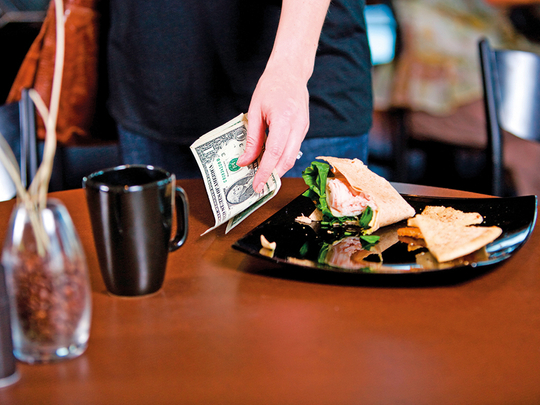
The balancing act plays out every day in restaurants across America: Servers who rely on tips decide where to draw the line when a customer goes too far.
They ignore comments about their bodies, laugh off proposals for dates and deflect behaviour that makes them uncomfortable or angry — all in pursuit of the $2 (Dh7.34) or $20 tip that will help buy groceries or pay the rent.
There was the young server at a burger joint in Georgia, Emmallie Heard, whose customer held her tip money in his hand and said, “So you gonna give me your number?” She wrote it down, but changed one of the digits.
There was the waitress in Portland, Oregon, Whitney Edmunds, who swallowed her anger when a man patted his lap and beckoned her to sit, saying, “I’m a great tipper.”
- New York Times
And at a steakhouse in Gonzales, Louisiana, Jaime Brittain stammered and walked away when a group of men offered a $30 tip if she’d answer a question. She returned and provided a “snappy answer” that earned her the tip, but acknowledges having mixed feelings about the episode.
“Literally every time it happens, I will have this inner monologue with myself: ‘Is this worth saying something, or is it not?’” said Ashley Maina-Lowe, a longtime server and bartender in Tucson, Arizona. “Most of the time I say, ‘No, it’s not worth it.’”
In the restaurant industry, the cultural reckoning over sexual harassment has felled celebrity chefs like Mario Batali and spotlighted pervasive misbehaviour by managers and co-workers. But servers and bartenders also face abuse from another front: the millions of Americans who dine out every year and who, because of the custom of tipping, wield outsize influence over one of the largest groups of workers in the country — 3 million strong, according to federal data.
Their workplaces are casual environments where alcohol lightens the mood and erodes boundaries. A “customer is always right” ethos often tilts the equation — creating the kind of power imbalance that has become front and Centre in a broader conversation about sex and gender in the workplace.
In interviews, more than 60 servers and bartenders — nervous teenagers and seasoned veterans, students and single mothers, a few men but mostly women — shared stories of crude comments, propositions, groping and even stalking from customers. They work in diners, chain restaurants and high-end dining establishments, and they reported hourly take home pay ranging from $8 to more than $40.
A number of efforts have arisen in the last several years to protect servers from harassment. Some restaurants have adopted no-tipping policies, eliminating the leverage of a gratuity. In Oakland, California, a restaurant called Homeroom devised a colour-coded system to monitor customer behaviour: a yellow flag if a server senses a potential problem, an orange one for inappropriate comments and a red flag for overtly sexual comments or touching, at which point the customer is asked to leave.
- New York Times
Workers’ advocates are pushing about a dozen states and the District of Columbia to change laws that allow restaurants to pay servers less than the minimum wage, making them more dependent on tips. New York recently cited harassment as one of the reasons it was looking into the way tipped workers are paid.
Working for tips means that each shift comes with questions that do not apply to millions of other workers around the country: How much money will I make, and how much will I tolerate to make it?
“When I first started, I used to get so creeped out and weirded out all the time,” said Brittany Gilbert, a server in Charleston, West Virginia, who has struggled to afford housing. “If you want to make the money, you’ll learn to laugh.”
The music was loud and the lights glowed red at Asia de Cuba, a clubby restaurant in New York with other locations overseas. On the second floor, Dana Angelo buzzed around the cocktail lounge in her uniform, a silky black dress that stopped midthigh with slits reaching higher. Her section was full, promising a good night.
- New York Times
As she paused at a table, a customer who was walking past reached under her skirt and then continued on his way.
She stifled the urge to scream. “I don’t want to do anything that makes these people leave and not tip me,” she said. “I’m looking at $200 in tips.”
Fighting back tears, she pointed out the offending customer to her manager, expecting the restaurant to take action. Instead, she saw the manager shaking the man’s hand.
“It was the second layer of hurt,” Angelo said. She has since moved to Los Angeles, and that location has closed.
With guidance from her union delegate she was able to inform upper management of the incident, which occurred several years ago; she said the general manager apologised and told her that what happened was unacceptable.
But most servers and bartenders are not organised, and many restaurants do not have human resources departments. Servers also said they were reluctant to report anything but the most egregious behaviour from customers; dealing with it simply comes with the job, they felt.
While legal action almost always targets misbehaviour by managers or co-workers, courts have also ruled that employers can be liable for not protecting workers from abusive customers.
“The employer has an obligation to make a safe workplace, and if you complain, they should do something about it,” said Joseph M. Sellers, a lawyer in Washington, D.C., with years of experience in sexual harassment cases.
Managers can protect workers by switching a waitress’ table or asking an offending customer to leave.
But even for bosses with good intentions, misbehaviour is difficult to police. Kaycee Lowe Wallace, who owned the Trolley restaurant in Hugo, Oklahoma, did not know that a regular customer was groping one of her servers until she got a concerned call from the young woman’s grandmother.
Wallace questioned the waitress, Klaycey Oakes, who told her that the man had grabbed her thigh and even followed her to the bathroom. “I was like ‘Why would you have not told me?’” Wallace recalled. “She was like, ‘Well, he leaves me $20 every time.’”
Oakes, 19, said the man was elderly and she had not wanted to cause a fuss. As it is for so many women, waitressing was her first job. Seventy per cent of servers are women, according to the Bureau of Labor Statistics, and nearly half are younger than 25.
“Their lives and experience of work is shaped by that initial experience,” said Saru Jayaraman, president of Restaurant Opportunities Centers United, an advocacy group for restaurant workers. “I’ve had Hollywood actresses, senators, IBM executives, lawyers tell me, ‘I have been sexually harassed later in my career, but I didn’t do anything about it because it was never as bad as it was when I was a young woman working in restaurants.’”
Danny Meyer, whose Union Square Hospitality Group owns numerous restaurants, recalled how trade magazines in the 1980s and 1990s advised women to increase tips by opening blouse buttons and placing a hand on the shoulder of male customers.
- New York Times
“That’s a dynamic that’s been going on forever,” he said in an interview.
Many servers acknowledged that they enjoyed a bit of cheerful flirting. Some welcomed compliments about their appearance; others hated them. Many said they drew the line at touching.
And while servers and customers occasionally dated, and even married, requests for dates, phone numbers and other propositions were usually unwelcome, they said.
Some of the most threatening situations occur when customers pursue employees outside work. Several women told of men who had waited for them in the parking lot or approached them as they took out the trash.
Maina-Lowe, the server and bartender in Tucson, was terrified when a man came in as she was closing up by herself one night. He asked if she was alone and told her that he had been watching her through the window. She ran out the back door and called police.
“I’m not generally a huge gun advocate, but I went and got one,” she said. “And every time I went to close the bar, it was in my purse.”
- New York Times
Despite her bad experience, Maina-Lowe said working in restaurants was still her best option. At her current job, she can earn $30 an hour in tips on a good night — nearly three times the state’s minimum wage.
The National Restaurant Association, the industry’s trade group, declined to answer questions about sexual harassment of servers and the role that tips might play in it. It said in a statement: “We condemn sexual harassment. Period. It does not matter if the harasser is a customer, a colleague or a manager.”












